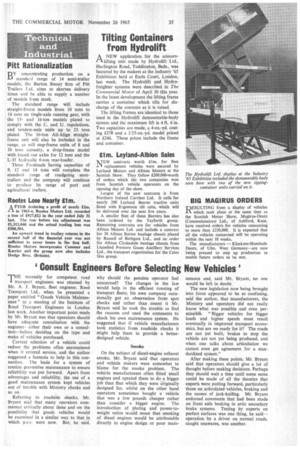Consult Engineers Before Selecting New Vehicles'
Page 37

If you've noticed an error in this article please click here to report it so we can fix it.
THE necessity for competent road transport engineers was stressed by Mr. A. J. Bryant, fleet engineer, Reed Transport Ltd., when he presented a paper entitled "Goods Vehicle Maintenance" to a meeting of the Institute of Road Transport Engineers in London last week. Another important point made by Mr. Bryant was that operators should have adequate consultation with the engineer— either their own or a consultant—before deciding on the type and make of vehicles purchased.
Correct selection of a vehicle could reduce the problems often encountered when it entered service, and the author suggested a formula to help in this connection. The basis for a system of routine preventive maintenance to ensure reliability was put forward. Apart from advantages and reliability, the use of a good maintenance system kept vehicles out of trouble with Ministry checks and So on.
Referring to roadside checks, Mr. Bryant said that many operators commented critically about these and on the possibility that goods vehicles would be examined in a similar way to that in which p.s.v. were now. But, he said,
why should the genuine operator feel concerned? The changes in the law would help in the efficient running of transport fleets; his own company occasionally got an observation from spot checks and rather than resent it Mr. Bryant said he took the trouble to find the reasons and used the comments to check his own maintenance system. He suggested that if vehicle manufacturers took statistics from roadside checks it might help them to provide a betterdesigned vehicle.
Smoke
On the subject of diesel-engine exhaust smoke, Mr. Bryant said that operators and vehicle makers were somewhat to blame for the smoke problem. The vehicle manufacturers often fitted small engines and uprated them to do a bigger job than that which they were o-riginally designed for, whilst on the other hand operators sometimes bought a vehicle that was a few pounds cheaper rather than consider a bigger engine. The introduction of plating and power-toweight ratios would mean that smoking of diesel engines would be attributable directly to engine design or poor main
tenance and, said Mr. Bryant, no one would be left in doubt.
The new legislation now being brought into .force appeared to be so confusing, said the author, that manufacturers, the Ministry and operators did not really know what was possible and even permissib16. "Bigger vehicles for bigger loads and higher speeds must result eventually in improved transport economics, but are we ready for it? The roads are not yet built, brakes to stop the vehicle are not yet being produced, and when one talks about articulation we cannot even get agreement for a standardized system."
After making these points, Mr. Bryant said that operators should give a lot of thought before making decisions. Perhaps they should wait a time until some sense could be made of all the theories that experts were putting forward, particularly those on articulated vehicles, braking and the causes of jack-knifing. Mr. Bryant endorsed comments that had been made on front axle braking in artic secondary brake systems. Testing by experts on perfect surfaces was one thing, he said— operation by a driver on normal roads, caught unawares, was another.
















































































































